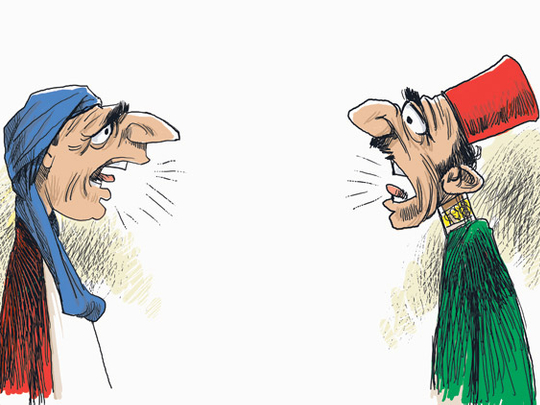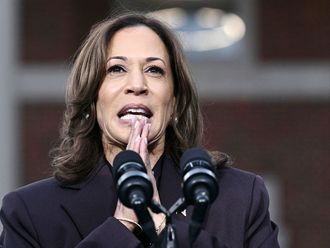
Twenty-five years ago, in the spring of 1985, I was invited by Morocco to view a vast project in the Western Sahara — sand fortifications, built by the Moroccan armed forces, stretching as far as the eye could see to keep out the Polisario, an Algerian-backed armed movement fighting for the independence of the territory.
Riding in a noisy Moroccan army helicopter, I viewed the sand wall from the air as it snaked its way across 2,400 kilometres of waterless desert. Since then, no fewer than six lines of fortifications have been built.
Ten years earlier, Moroccan troops had arrived at Al Aaiun (now called Laayoune), the capital of the territory, sparking clashes with Polisario guerrillas. Heavy fighting was to follow in 1989, until a UN-sponsored ceasefire was agreed in September 1999, when both sides suspended military operations.
But the conflict — Africa's longest-running territorial dispute — remains unresolved. It seems doomed to remain so.
The latest person to struggle to find a solution to the problem is Christopher Ross, a former American diplomat who is now the personal envoy of UN Secretary-General Ban Ki-moon. From June 21 to July 2, Ross travelled to Washington, London, Paris, Madrid and Moscow to seek the support of these countries in a bid to break the stalemate. But UN sources report that he has been no more successful than his predecessors — who included no less a person than James Baker III, former US secretary of state, appointed by the UN secretary-general in March 1997.
After extensive consultations, Baker submitted his first peace plan to the Security Council in June 2001. It envisaged the integration of the Western Sahara within Morocco, but with a degree of autonomy. Morocco accepted it, but the Polisario rejected it. In April 2004 Baker submitted a second peace plan. This time Morocco rejected it, since it mentioned the option of independence. Baker resigned in June 2004.
Other UN envoys were appointed. Several peace plans followed, as well as several rounds of face-to-face negotiations, mainly in the United States. All were abortive. On January 7, 2009, Christopher Ross, the latest personal envoy for the Western Sahara, was appointed. It is too early to write off his mission as a failure, but the omens are not good.
Hampering development
Does the conflict matter? Yes, because while it persists, Morocco and Algeria remain at loggerheads and the ambition to create a Greater Maghreb — to attract foreign investment, establish new industries, provide jobs and allow free movement of people and goods — remains a pipe-dream.
Without a resolution of the conflict there can also be no effective regional cooperation against terrorism. There is an evident need for a single body to coordinate the anti-terrorist activities of all the countries in the region, but this would require a trusting relationship between them and a political entente.
The harsh truth is that Morocco is adamantly opposed to the independence of the Western Sahara, a territory of some 266,000 square kilometres, ruled by Spain until November 14, 1975, and inhabited, according to a 2009 estimate, by some 500,000 people.
Vital interest
Squeezed between the Atlantic Ocean and Algeria, Morocco would have no land route to black Africa without control of the Western Sahara. Rabat therefore considers ownership of the territory a vital national interest.
North African sources familiar with the conflict say that the positions of Morocco and the Polisario are irreconcilable. It may even be that both sides are not unhappy with the continued stalemate. Although they would never admit it, both seem content with the status quo, and find it useful.
Neither party has the political will to engage in meaningful negotiations. They would need to be convinced that the status quo is not sustainable in the long-term, but who has the power, the regional influence or the motivation to persuade them of that?
Morocco offers only autonomy, whereas the Polisario want a genuine referendum on self-determination, in which political independence is an option. Algeria supports this position. But Morocco has so far excluded such a referendum — and enjoys the full support of France.
The Polisario was founded in April 1973 in Zouerate, Mauritania. Its leadership consists of old men who have staked their life on independence. They are not willing to let go of the dream or to tell their people that the best they can realistically hope for is autonomy under Moroccan sovereignty.
On November 6, 1975, Morocco signalled its determination to hold the territory at any price when some 350,000 Moroccans took part in a ‘Green March', crossing the border into the Western Sahara. On February 26, 1976, Spain officially withdrew. The following day the Polisario proclaimed the creation of the Sahrawi Arab Democratic republic.
Three months later, in May 1976, the first refugee camps of Sahrawis displaced by the fighting were established close to the border at Tindouf, in Algeria. Today, some 150,000 refugees sit in these desert camps, virtually forgotten by the world. It is a human tragedy, only partially relieved by the UN High Commission for Refugees, which facilitates contacts between the refugees and their families and provides free telephone services.
Patrick Seale is a commentator and author of several books on Middle East affairs.









